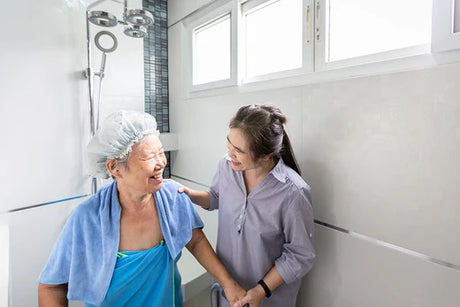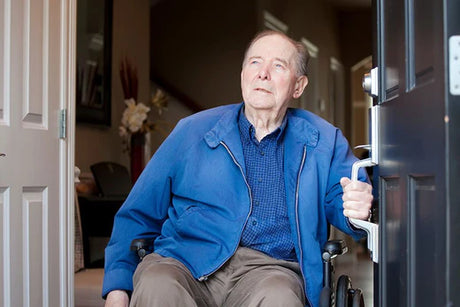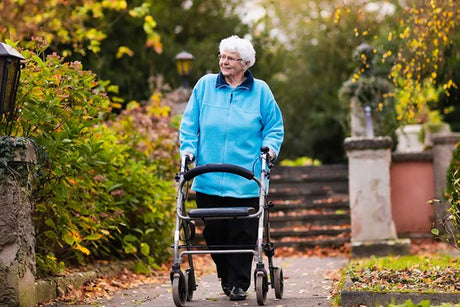
-
One of the largest mobility-affected groups is our: senior citizens or elderly community.
As we age, it’s natural for our motor skills to reduce and movement to slow. For some, the mobility challenges come from a specific condition like arthritis. For others, it’s simply a result of entering the latter years of life. But when we’re in retirement, do we really want to slow down experiencing things and going places? Of course not.
In this resource we cover the topic of mobility in the elderly community including useful tips about available equipment, preparing the home and bathroom usage. It’s a resource for elderly people experiencing mobility reduction, their families and occupational therapists, too.
-
![Image of MODEL SB1 "ShowerBuddy", featuring a modular chair and track system designed for bathroom mobility, displayed in a modern bathroom setting.]()
MODEL SB1 “ShowerBuddy”: The modular chair and track system is designed to clear raised shower tray edges. Once the chair is locked in the shower position the front bridge tracks can be remove to aid carer access.
Our helpful Mobility Guides
-
![Image showing an elderly person being assisted into a car with a wheelchair in the background, titled.]()
Introduction To Assistive Technologies For The Elderly
As technology advances every year, the quality of life for a mobility impaired senior improves along with it. Assistive technology helps conduct daily activities with less effort, supporting a better quality of life. Incorporating a smart daily care plan or routine with quality assistive equipment is a recipe for independence and freedom during retirement. In this guide we’ll provide a run down on some common types of assistive technologies.
-
Tips For Transporting Elderly With Mobility Challenges
Getting from place to place becomes a slower, more complicated process when personal mobility reduces over time. And there’s no doubt that most seniors in retirement still have an appetite for socialising, shopping, travelling or simply having a change of scenery locally. Transportation in retirement may mean extra precautions with independent travel such as driving a car, or may require utilising a service to be picked up and taken places. In this guide, we explore some of the ways transportation can be made easier for elderly people with mobility challenges.
Ways To Make The Home Easier For Mobility Impaired SeniorsOur homes in retirement should be as accessible and simple to live in as possible. With reduced mobility comes more chances of hazards through a poorly laid out or cluttered home. Access into and out of the home becomes critical for safety. And conducting daily activities like cooking and bathing need to be done safely and efficiently. A home can be prepared for mobility challenges in a number of ways. In this guide we offer some suggestions for making the home easier for a senior with special needs andor reduced mobility.
-
How To Empower Disabled Elderly To Maintain Independence In Their Lifestyle
Independence isn’t something that should disappear automatically with reduced personal mobility; in fact any ways to retain independence should be prioritised in any care plan. For our elderly community, keeping independence and choices in their lifestyles is a core component of staying happy and engaged in daily life. It’s important that family members and carers support their elderly loved one to realise their own independence as much as possible, especially if there are times of the day that they do rely on some help. In this guide we explore some ways to empower mobility impaired seniors to take a controlling role in their daily lives.
How To Navigate Bathroom Challenges Faced By Elderly People
Using the bathroom as a senior citizen experiencing a loss in coordination, muscle strength and manoeuvrability can provide a daunting task. There’s perhaps more unique and tricky body movements required in a bathroom routine than any other part of daily life. And it’s not just the movements that present a challenge; the bathroom comes with environmental hazards that need to be factored in as well. In this guide we go in depth into bathroom challenges faced by elderly people with mobility issues, and help provide solutions to make this process more comfortable.
-
Support systems for the elderly
-
Creating a strong support system for your elderly loved one
Caring for our elderly family members looks different for everyone. Not only will our readers have senior loved ones at different ages, each person’s mobility reduction presents differently at each age. But what everyone in our elderly community needs is a good support system that enables them to live the life they want in retirement.
Whether you’re the person experiencing mobility loss due to age, an adult child, a partner, husband/wife, or friend, you can help establish this support by:
- Making a practical decision around where to live.
- Engaging with community support services.
- Getting help from an Occupational Therapist who specialises in elderly care.
- Spending time listing out ideal daily/weekly routines.
- Working in family/friend support regularly (even if simply visiting).
- Organising transport.
- Delegating roles like financial affairs to trusted family members (often children or partner).
- Supporting social interactions with friend groups or hobbies like board games or bingo.
- Arrangement of assistive technologies to make mobility easier.
A support system for a senior that’s spread across multiple parties helps to keep life varied and interesting, while sharing the load of physical support, too. More important than anything is the need to keep the individual in control of decision making where possible. This means support should empower quality of life and remove barriers to enjoyment of each day. Mobility is just one element of this support.
We provide more information in our downloadable PDF section Supporting the Elderly Resources – find this further down the page.
-
![Image of a Showerbuddy mobility and shower chair positioned over a toilet, designed to assist individuals with limited mobility in the bathroom.]()
Avoid sudden changes to bathroom routine
-
Protecting independence in the bathroom for seniors
Being independent in the bathroom isn’t just a privilege for those with complete mobility and motor skills. We strongly believe that dignity in the bathroom is a fundamental right of all people. It can be particularly stressful for someone going through their senior years to experience loss of mobility in the bathroom after a lifetime of using the bathroom alone independently.
It’s why our elderly community needs extra attention to make sure that the daily routine puts as much of the bathroom activity in their control. The way families can do this is with a combination of preparing the bathroom properly, a routine and assistive technology to reduce reliance on other people. While there may be some carer help, the right equipment can allow more freedom for the individual to enjoy bathing and toileting.
It’s important that changes to the bathroom routine are not made suddenly and without the right preparation. Immediate loss of independence in the bathroom isn’t easy, so using the help of an occupational therapist and careful planning is highly recommended.
Mobility Resources
-
Downloadable: Product Details
Downloadable Resources
Here you’ll find our downloadable resources to help support your elderly loved one with their mobility impairment:
List Of Senior Citizen Support Services For Mobility and Care
In this downloadable PDF, we have outlined local senior support resources that you can access in your area. These may help with travel, in home care, equipment, or other support to help seniors with mobility challenges enjoy life.
-
Home Mobility Checklist For Seniors Living Independently
Getting the home prepared for daily living by a mobility impaired senior? Our checklist offers a number of key areas you’ll want to review for accessibility.






